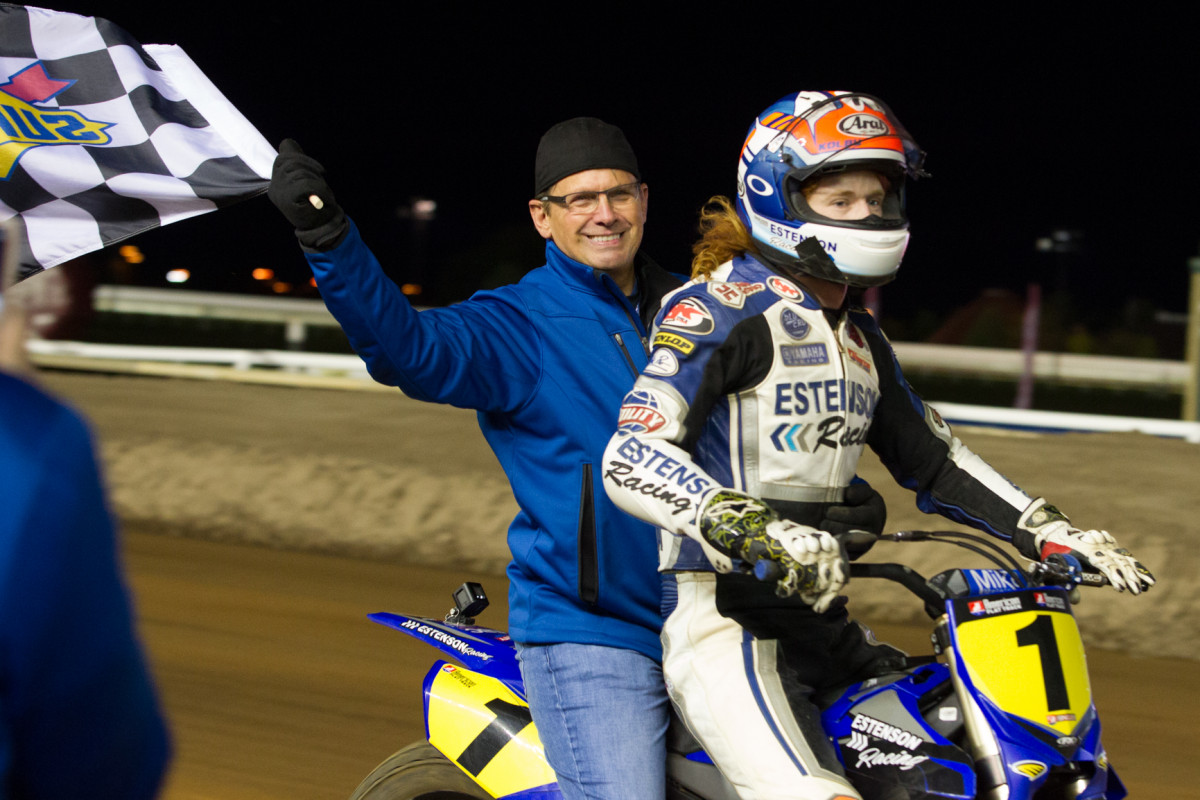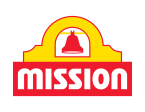
The AFT Interview: Tim Estenson
At any of American Flat Track’s 18 events throughout the year, Estenson Racing is one of the teams you really can’t miss, especially if any blue and white – or classic yellow-’n-black – Yamaha blood runs through your veins.
The team’s logoed trucks and tents are large, modern, scrubbed white and well designed; the toolboxes and various paddock accoutrement bristle with modern functionality; the riders’ gear is clean and aesthetically pleasing, as is that of the crew; and the twin- and single-cylinder Yamahas are some of the best-looking and best-performing anywhere … trick, light, fast and very much up to date. The entire team is polished and professional to the core, with a brand savvy that belies its short time – just two years – in the series.
It all looks pretty much what a factory Yamaha effort would look like – without the Yamaha Factory Racing logos, that is. And that look is no accident. Because if you know anything about team principal Tim Estenson, or the Estenson Logistics trucking business he launched in 1999 and built with partner Paul Truman over a 19-year span (and sold recently for millions), you know the guy is all business, all brand quality, all serious.
Still, there’s more to the motorcycling magic than simply good business, solid branding and polished professionalism. Tim Estenson, it turns out, is more than simply a business-savvy American success story; he’s also a hard-core motorcycle guy, one that grew up kicking around a family-owned Yamaha shop in North Dakota, and a guy who raced flat track and scrambles as a kid and teenager growing up in the northern plains. All of which means the guy has plenty of that yellow-’n-black blood flowing through him.
There’s more to the Tim Estenson story, too, elements that are dark and troublesome, and ones the reserved and private Estenson himself isn’t all that eager to talk about. But talk about them he does, partially because it’s cathartic, but mostly because he knows his story of personal and professional redemption can be helpful to a younger generation that often falls into some of the same ruts his wheels found early in life – namely, alcohol and drug use.
Extricating himself from that morass, getting himself straightened out, and learning the value of self-confidence, pride and hard work were not easy things to accomplish. But where there’s a will there’s a way, the old saying goes, and Estenson’s journey from a dead-end drunk truck-washer to architect and owner of one of the country’s most sought-after trucking firms is proof positive of the old saying’s veracity.
In many ways, Tim Estenson and Estenson Racing exemplify the new professionalism that’s slowly but surely weaving itself into the fabric of American Flat Track, right alongside the Harley-Davidsons, Indian Motorcycles, Crosley-Howertons, the handfuls of small-but-savvy teams that populate the AFT paddock, and all the substantial teams and sponsors on the verge of jumping in full-tilt for 2019. On top of all that, Estenson is also re-committing his team fully to Yamaha for the 2019 season, and says he’ll do “everything in his power” to put Yamahas on the AFT Twins and AFT Singles podiums as much as possible this coming season.
We caught up with Estenson in the days following the team’s announcements regarding its expanded rider lineup and plans for the 2019 American Flat Track season. He’s a quiet and reserved guy, for sure, but ask the right questions and you’re bound to get an earful. “After all,” he says, “we’re here to win races and championships. That’s the goal.”

Tim Estenson chatting with Jake Johnson, his lead AFT Twins rider in 2018, at the OKC Mile earlier this season. Estenson feels he let Jake down a bit this season, and wants to give him better machinery - and a better chance at victories - in 2019. Photos courtesy of Estenson Racing, Andrea Wilson, Scott Hunter and the Tim Estenson archive.
Your team is more than doubling in size for 2019. Tell us about that…
Yes, as our press releases stated recently, we’ll be fielding a five-rider team in 2019, with two AFT Singles riders and a trio of guys in AFT Twins and Production Twins. Our Twins team will consist of Jake Johnson, Kolby Carlile and JD Beach, all three riding Yamahas MT-07 machines this year, as we’ve sold our Indians and will be all-Yamaha in 2019.
We’re all pretty excited about the season and the potential of being able to compete a little more seriously against the very good Indian FTR. Ricky [Howerton] is in the same basic boat as us in that respect; I told him, ‘It if isn’t us on the top of the box, I hope it’s you!’ It’s sort of an us-against-the-world thing with our two teams in the AFT Twins division, and I’m sure we’re both pretty excited about the possibilities. If we can help make these off-the-shelf Yamaha and Kawasaki engines truly competitive again, as they were in 2016 and 2017, we’ll help open the sport up to more and more riders and teams, which will be good for the sport and good for the on-track action.
Newly signed Ryan Wells will spearhead our AFT Singles effort on Yamaha’s latest YZ450F, with Dallas Daniels joining him on track for the Lima, Ohio, Half-Mile and beyond. [Dallas turns 16 a few days before Lima and is therefore legal to begin his AFT Singles career there. -Ed.] Dallas’s father Nick will head up our Singles effort, and Dallas will be an integral part of our team for the first part of the season, helping out as necessary and learning from Ryan, who’s got a lot of experience to pass along.

JD Beach will become a full-time AFT Twins rider in 2019 aboard Yamaha MT-07 machinery for Estenson Racing. "We're overjoyed to have JD," Estenson says. "Other big teams were after him, but I think he liked what he saw in us." Photo by Scott Cavalari.
JD Beach and Ryan Wells are extremely talented, and Dallas Daniels is ultra-promising, and of course there’s Jake and Kolby, which means you’ll have a powerhouse team for 2019.
That’s the idea. We wanted to build things during the off-season, rider-, crew- and facility-wise, and I think we have. Getting JD [Beach] was a longshot, and I didn’t know if we could get him, to be honest. He had other major teams interested in him, so we’re very fortunate to have a rider and person of his caliber. I think he saw what we’re doing here – we’ve built a new, state-of-the-art shop, for example – and liked it…the family atmosphere, the machinery, the people, the facility overall. He’s going to be a great addition, and he’s close with Kolby, so he’ll be able to help him quite a bit as he learns the ropes in twins.
I very much wanted to bring Jake [Johnson] back for another season, as I felt like I let him down in some ways this year. He didn’t get a fair shake with us, and I want to give him a better opportunity. We put him on a largely untested motorcycle this year, and he got on it with basically zero testing time. He didn’t even sit on the Yamaha he was going to race until Daytona. We struggled, but he did really, really well with what he had. Hopefully we can fix that for him this season.
Ryan Wells is really talented, and he’s moved to the Phoenix area to take full advantage of the opportunity with us – ride year-around, train, all of that. It’s exciting, because we already know he’s championship material, and we know he’ll help Dallas, who’ll be with us from the beginning of the season and who’ll begin racing with us at Lima. Dallas is already riding and testing non-stop, and we’re sure he’ll be super-comfortable come June. And with Ryan’s help he’s bound to get up to speed quickly.
And then there’s Kolby, who’s moving up to twins this year.
Yes, Kolby will be riding a twin all year, and we’ve decided to have him make the transition up through the Production Twins class while preparing for the 2020 season. There are 11 Production Twins races scheduled in 2019, and he’ll ride the other seven in the premier AFT Twins class, starting with Daytona and Atlanta. We know this will be somewhat of a learning year for him, but he’s got the right skills and attitude, so we’re all pretty excited for him. I know he’s excited.

Tim Estenson says winning the 2017 AFT Singles title with Kolby Carlile was a "dream come true," and something he dreamed of as a young racer growing up in North Dakota.
What was it like winning that AFT Singles championship with Kolby in 2017?
Wow. Amazing. Just blown away. As a kid, you dream of that sort of thing, winning a championship, and as a teenage racer I thought of it all the time. It never happened for me. So it was pretty powerful stuff to be involved in helping make it happen for him. It was so over the top. I was so proud of him. I can’t really explain it. It was almost an out-of-body experience for me. A title…and in our first full year of competition. Just a dream come true. Very happy for him and our entire team.
What made you sign Kolby in the first place?
Halfway through the 2017 season I was watching Kolby. He was moving around, not really comfortable, with one team then back on his own. I saw something special in him and wanted to help him. He had a certain personality. A gleam in his eye. His interactions with fans, and on camera... the way he sold his merchandise. And his on-track abilities; he rode aggressively, but in control. He never crashed. I saw him as a kid who could grow, but one who already had a ton of talent. With his personality I knew I could work with him. And I knew we could build a fast 450. And it ended up working out wonderfully.

Estenson grew up kicking around his family's Yamaha shop in Fargo, ND, and began racing Yamahas at an early age. Gotta love that style!
You mentioned dreaming of a championship yourself. Tell us about your motorcycling roots.
I grew up in the Fargo, North Dakota area and started riding pretty early, first on minibikes and then on Yamahas, because my father and older brother were partners in a Yamaha shop. I was at the shop all the time, working, putting bikes together, and then, little by little, I started racing in dirt track and scrambles events, which my brother also competed in. We ran the local Badger circuit for a number of years, and I pretty much ran Yamahas the entire time.
I rode Bultaco Astros for a while, but then got back on Yamahas. When my brother quit racing he started building my bikes for me, and I did pretty well, running Yamaha 360s with Cheney Engineering frames. They had flexy swingarms and the chain would occasionally fall off, but that was all we had. I ran as a Novice and finally earned my Junior license, and had a lot of regional success, but when I got the chance to run at Daytona, at better tracks and against better riders, I was a mid-pack rider at best. I rode a bit over my head and ended up getting hurt, and when the doctor said I’d very likely be paralyzed if I crashed again, I hung it up for good. It had been a wonderful time in my life, but when it all ended it was pretty depressing. And I started drinking and partying more and more.

Estenson got pretty good at the flat track thing as a teenager, moving successfully from Novice to Junior until injuries - and the realization he wasn't quite national-champion material - hit him square in the jaw. He quit racing and began drinking, and as a 10th grade dropout, had no Plan B.
What happened next?
Well, I’d left school in the 10th grade, thinking I’d be a professional racer, and when it all ended I was in total shock. I had no Plan B. Here I was, eighteen years old, living in North Dakota, with no job and no prospects. It was 1976, a crazy, wild time in America. ‘What am I gonna do?’ I asked myself. The drinking and partying got worse, and I ended up screwing up my life. It was a really dark time for me.
To make ends meet I got a job at a trucking company, washing trucks in sub-freezing temperatures. Fun job. But little by little I moved my way up, even while doing every crappy job you can think of. And I somehow mustered enough self-preservation instinct and pride to realize what I was doing to myself through the drinking and drugging, and that I was better than that. And I got help.
It worked. I was not only able to somehow get clean (and have stayed sober for 40 years now) but worked hard enough to get promoted quite a ways up the ladder at that trucking company. I also learned the ropes of the business, which helped me form the idea for Estenson Logistics, which I launched in 1999 with financial partners Paul Truman and his father.
Tell us about that.
It wasn’t easy, and even after a year of working my tail off for no money we were on the brink of bankruptcy. I knew my idea would work; I just had to keep working and keep things afloat until the break came. And it finally did. After losing money for many months we finally signed some larger clients, and with our motto of being a ‘dedicated service provider’ front and center, we grew into one of the best transportation and logistics companies in the country during the next 19 years, going from one employee – me – to over 3000.
The company philosophy has always been largely based around this: It’s all about the people. Not getting rich. Treat people the way I wanted to be treated. Create an environment for employees to live a stable life. Hire the right people, open-minded people who can learn, who want to be part of something great. Let them become successful. Let them get so good at their jobs that everyone wants to hire them, but make it so good for them at work that they never want to leave. It seems to have worked. It’s what we’re trying to do at Estenson Racing, too. It’s not typical in racing, not traditional. But it’s what we’re trying to do.
You sold your company a while back, and now have the resources and time to do what you want. What led you back into motorcycling and racing?
For years and years, working and building the business took most of my time, and a few years ago my wife Traci – who has always supported my craziness – said one day, ‘that’s it...you gotta do something for yourself. You work too much.’ She asked if I had any hobbies, and what I enjoyed. I’m not into golf, so I flashed pretty quickly on motorcycles, something I loved but gave up years and years ago. The idea was really appealing, so I started collecting vintage motocross bikes (which I still do) with some help from a gentleman whose son was a national number-holding flat track racer. I ended up sponsoring him in 2016, and through him I met Ted and Cory McDermitt, who helped me assemble our 2017 team, which included Sammy Halbert. We had a good time and a successful year in 2017, pushing back against the then-new Indians and winning the AFT Singles title, and one thing led to another – and here we are, getting ready for 2019.
Is this a trend? Successful and well-off professionals getting involved in and supporting professional flat track?
With OEMs tightening up budgets and withdrawing support in motorcycle racing as a whole, I think the sport needs it. There are a lot of young riders that need the support, and it’s very rewarding personally to be able to be a part of helping these athletes have the opportunity to chase their dreams.
My hope is that guys like myself and Jerry Stinchfield and others who’ve had some success and have the financial resources to help will get involved in the sport they love. My message to guys and gals out there is this: It’s all here, just waiting for you, so come enjoy it. If we can keep the momentum going it will be helpful to the sport as a whole and the riders and teams in the paddock. And that’s a good thing.

Estenson conferring with Carlile at this year's Calistoga Half-Mile, where the 'Flying Tomato' got sixth on his way to a fourth-overall placing in AFT Singles for the season - with three victories to his credit.
You’re a major supporter of the Rookie Class of ’79 charity. Tell us about that.
When I came back into the flat track fold, my wife Traci and I – who are involved in a number of different charities – heard about the Rookie Class of ’79 thing and looked into it. It was doing some amazing work, helping riders who’d gotten hurt and needed help, many of whom didn’t have insurance. We met Charlie [Roberts] and started helping a little here and there behind the scenes, and over time began to see how the organization worked, how it was structured and how it operated. We were helping a little financially in the beginning, and eventually they asked for our opinions on the business side. I was invited to be on the board, which I was happy to do. It needed a more professional look at the race track, which we now have, and we needed to set up a separate operating budget to be sure that the charity was sustainable. So now we have a donation category for operating costs and a separate donation category specifically for injured riders, which is how it should be, and those numbers have doubled and tripled over time. We’re also attracting sponsors and creating income streams for the injured riders. It’s exciting what’s happening there, and we’re really happy to be involved!
Giving back to the flat track community seems to be a theme here.
It is. I’m blessed to be where I am. I’m a self-taught guy with a GED, and the idea that someone like me can be successful in life through good ideas and hard work and a good plan is something I’d like to impart to as many young minds as I can. And if my story can be helpful to a kid who’s fallen into some of the ruts I fell into – alcohol, or worse – all the better. I have a racer’s mentality; I like to win. But winning in life is even more important than winning on the track, and if Traci and I – and Estenson Racing – can somehow help a young person or racer do that, fine with me.
Thanks, Tim, and best of luck in 2019.
Thanks!






























